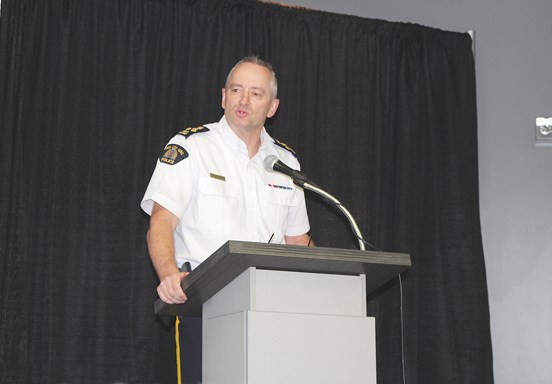How to best deal with crime in rural areas is an issue which gained much more attention following an incident on a Saskatchewan farm in 2016.
On Aug. 9, 2016, Colten Boushie was shot and killed on the farm of Gerald Stanley.
Stanley was charged with second-degree murder in Boushie’s death. He pleaded not guilty. After a two-week jury trial, the verdict in the Court of Queen’s Bench in Battleford was not guilty.
The case brought into focus a variety of issues, all revolving around the safety of rural residents.
Delegates to the East Central Region meeting of the Saskatchewan Urban Municipalities Association were given some first-hand insight into what is being done to address that most basic concern when RCMP Assistant Commissioner Curtis Zablocki, Commander “F” Division, gave a presentation on Policing and Community Safety Friday in Yorkton.
Not surprisingly, an overriding issue revolves around the logistics of peacekeeping. Saskatchewan “is a large geographic area with a small population,” said Zablocki.
The area that the police must cover, with a finite number of officers, leads to “concerns around police visibility and response times,” he said.
The issue is being made worse by the trend of urbanization, which means “neighbours are getting farther and farther apart,” said Zablocki, adding it also means rural residents are often farther away from a police department.
As a result, two things have to change.
On one hand, the way rural residents protect their property has to evolve.
As a rule, Zablocki said rural people are trusting, and that has meant leaving keys in vehicles and ATVs sitting in the yard. That needs to change as criminals see isolated rural locations as softer targets because items are not locked down as they are in larger urban centres. While admitting locking down everything can be a nuisance, it is a step rural residents need to undertake to protect their property.
Who is involved in policing and how they do their job must also change.
As an example, Conservation Officers and Saskatchewan Highway Patrol can now be called upon as first responders to criminal code calls when those officers are closer than the RCMP, said Zablocki.
It is a change that Zablocki sees as positive.
“We’re able to enhance our response time,” he said, adding that in turn “enhances public safety.”
Of course, that safety is the key to any change made. It must be positive in terms of being on scene to help rural residents when they need it most and, in more general terms, it has to generally enhance safety. No one change will be the answer, but tweaking the system can have the effect we all hope to see in ensuring rural safety.



